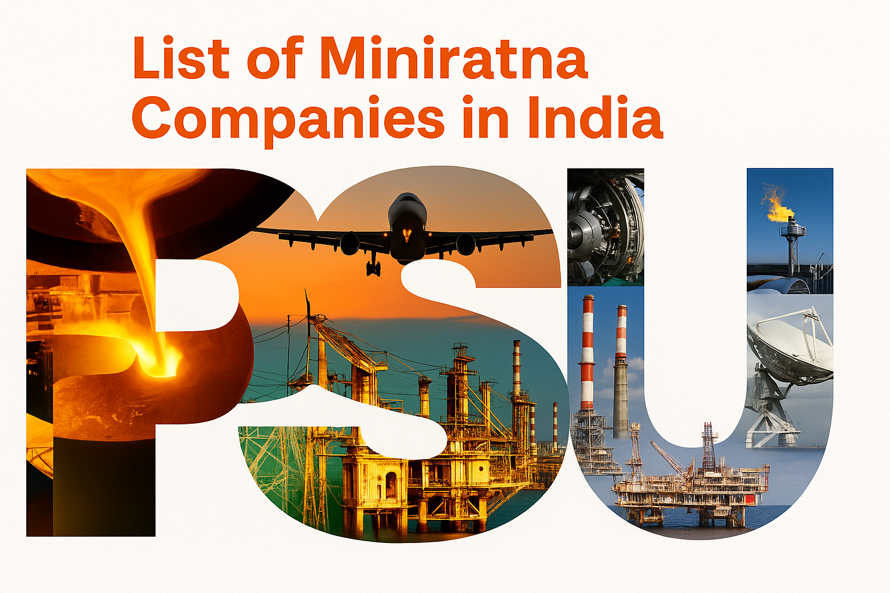List of Miniratna companies in India: An overview

Miniratna companies are a special category of Indian government-owned enterprises. Compared to other public sector undertakings (PSUs), these companies are usually given more operating and financial freedom. Moreover, in many areas, like aviation, telecommunications, defense, and engineering, miniratna companies in India make a big difference and are very important to economic growth.
What is a miniratna company?
Miniratna is a public sector undertaking that demonstrates steady operating and financial efficiency. The Indian government gives these companies more freedom and power to make decisions, allowing them to work more and fight better in their fields.
The Indian government owns and runs Miniratna companies, but they have more freedom in running their day-to-day businesses. This freedom lets them make smart choices about investments, joint partnerships, and other business projects without always having to get government approvals.
List of miniratna companies in India in 2025
There are two categories of Miniratna companies in India, based on how financially independent they are and how well they do:
Miniratna I CPSEs
To belong to Miniratna Category I, a company must have made a profit for three years and have a good net worth. These businesses have more freedom to do what they want than other PSUs. Moreover, they can spend up to Rs. 500 crores or their net worth, whichever is less, without getting permission from the government.
Miniratna II CPSEs
Miniratna Category II companies must demonstrate profitability for the past three years. Still, they can spend up to Rs. 300 crores or 50% of their net worth, whichever is less, without getting permission from the government. Besides, these companies enjoy significant freedom, allowing them to work more efficiently and quickly adapt to market changes.
Overview of Miniratna companies in India
There are 59 Miniratna firms in India as of May 2025, according to the website of the Department of Public Enterprises. The following is a list of Miniratna companies in India. Please note that the list is not exhaustive.
• Airports Authority of India (AAI)
The Airports Authority of India was established on April 1, 1995, and is the official body in charge of improving, building, managing, and monitoring all of India’s civil airport facilities. Further, AAI oversees 137 airports, including 10 customs airports, 103 domestic airports, and 24 international airports.
• Bharat Dynamics Limited (BDL)
Bharat Dynamics Limited was founded in 1970 and produces and provides the Indian Armed Forces with airborne items, defense gear, and guided missiles. In the year 2023, Bharat Dynamics Limited had a net income of 6.13 billion Indian rupees.
• Bharat Sanchar Nigam Limited (BSNL)
Established in 2000, Bharat Sanchar Nigam Limited provides landline, mobile, and internet services nationwide. Further, the business organizes, sets up, integrates, and manages its telecommunication services.
• Cochin Shipyard (CSL)
Established in 1972, Cochin Shipyard Limited is India’s largest shipbuilding and repair business. It builds, fixes, and refurbishes a wide range of ships. Besides, the company specializes in aircraft carriers, patrol vessels, tankers, and other specialized marine vessels. It works with both the defense and commercial sectors.
• BEML Limited
BEML Ltd operates under three business verticals: Defense and Aerospace, Mining and Construction, Rail and Metro. It has four manufacturing facilties located in Bengaluru, Kolar Gold Fields, Mysuru, and Palakkad.
• Garden Reach Shipbuilders & Engineers (GRSE)
Garden Reach Shipbuilders & Engineers, one of India’s top shipyards, founded in 1884, is based in Kolkata. It is responsible for the production of ships and the design of vessels for the Indian Coast Guard and the Indian Navy. Furthermore, it produces engines and does engineering work in addition to constructing commercial boats.
• Goa Shipyard (GSL)
Goa Shipyard Limited (GSL) was established in 1957. Its goal is to offer a range of services focused on designing, building, and maintaining commercial ships, offshore platforms, and naval vessels.
• India Tourism Development Corporation (ITDC)
The India Tourism Development Corporation (ITDC), which was established in 1966, is primarily concerned with running hotels, providing transportation services, and building up the nation’s tourism infrastructure.
• Mangalore Refinery & Petrochemicals Limited
Mangalore Refinery & Petrochemicals Limited is into the business of refining of crude oil. The firm operates through the Petroleum Products segment.
• HLL Lifecare Limited
HLL Lifecare Ltd is India’s leading provider of a wide range of contraceptives, hospital, and Ayurvedic products, as well as a range of women’s products.
• MECON Limited
MECON Ltd is a state-owned consultancy and engineering firm headquartered in Ranchi, India.
• Bharat Coking Coal Ltd
Bharat Coking Coal Ltd is a subsidiary of Coal India Ltd, the government-owned coal mining company.
Eligibility criteria to become a Miniratna company
Organizations are required to fulfill the following requirements to be eligible for the status of Miniratna companies in India:
• For Miniratna Companies in Category I
For the last three years, a firm must have regularly reported earnings to be included. The company must have achieved a pre-tax profit of at least ₹30 crore during the last three years. Alternatively, it should have maintained an average annual turnover of ₹120 crore in that timeframe.
• For Miniratna Companies in Category II
For a company to be eligible, it must have generated profits during the last three years. Furthermore, they must have achieved a pre-tax profit of at least ₹20 crore in one of those years. Alternatively, they should have maintained an average annual revenue of ₹80 crore over the last three years.
Benefits of Miniratna companies in India
Miniratna companies in India are one of a kind in the stock market. Monitoring Miniratna share prices and the general performance of these Miniratna firms’ stocks might help investors find profitable ventures. Therefore, having the status of a Miniratna comes with a lot of benefits, including:
• Operational Autonomy
Miniratna companies have more financial and operating freedom than other public sector organizations. Without initial authorization, they may determine where to spend money, launch joint businesses, and work on technology to a certain extent. This speeds up and simplifies decision-making.
• Economy-Boosting Actions
India’s growth story would have been different if Miniratna hadn’t been operating in crucial sectors such as energy, transportation, telecoms, and engineering. The state sector’s constant success and capacity to make a profit enhance the economy’s general input.
• Generating Employment
These companies create significant employment opportunities, both directly and indirectly. Their expansion and diversification measures often result in jobs in various geographies and at various levels of expertise.
• Greater Efficiency
Now that Miniratna companies in India are more independent, they use modern management techniques and emphasize success. This often leads to higher output, lower costs, and greater competition in local and international markets.
• Infrastructure Growth
A significant number of Miniratna companies in India play an essential part in the development of national infrastructure. For instance, organizations such as the Airports Authority of India (AAI) support the development of transportation and aviation infrastructure.
• Assistance to Key Sectors
Miniratna works in important areas that help keep the country safe, ensure enough energy, and improve technology. These areas are extremely important in protecting India’s strategic interests.
• Regional Development
These companies, by setting up shop in underdeveloped or isolated areas, lessen economic gaps between states and encourage balanced regional development.
• Revenue for the Government
Dividends, taxes, and duties are typical ways that Miniratna companies support the exchequer.
Conclusion
Miniratna companies in India have greater flexibility and autonomy, which allows them to make wise decisions quickly, free from frequent government intervention. These companies also encourage talent and responsibility by strictly adhering to transparent policies and excellent business ethics.
FAQs
Q. How many Miniratna companies are there in India?
India has 59 Miniratna companies, as of May 2025.
Q. Which are the 14 Maharatna companies in India?
The following are the 14 Maharatna companies in India:
– Bharat Heavy Electricals Limited (BHEL)
– Bharat Petroleum Corporation Limited (BPCL)
– GAIL India Limited (GAIL)
– Coal India Limited (CIL)
– Hindustan Petroleum Corporation Limited (HPCL)
– Steel Authority of India Limited (SAIL)
– National Thermal Power Corporation (NTPC)
– Rural Electrification Corporation Limited (REC)
– Power Finance Corporation (PFC)
– Power Grid Corporation of India Limited (POWERGRID)
– Indian Oil Corporation Limited (IOCL)
– Oil & Natural Gas Corporation Limited (ONGC)
– Oil India Ltd
– Hindustan Aeronautics Limited
Q. What do you mean by a Miniratna company?
In India, Miniratna companies are public-sector enterprises that have been given financial independence because of their steady profitability. Moreover, these businesses have more power to make decisions and are split into two groups based on financial performance.
Q. Which is the 25th Navratna company in India?
Indian Railway Catering and Tourism Corporation (IRCTC) is the 25th Navratna company in India.
Disclaimer
The stocks mentioned in this article are not recommendations. Please conduct your own research and due diligence before investing. Investment in securities market are subject to market risks, read all the related documents carefully before investing. Please read the Risk Disclosure documents carefully before investing in Equity Shares, Derivatives, Mutual fund, and/or other instruments traded on the Stock Exchanges. As investments are subject to market risks and price fluctuation risk, there is no assurance or guarantee that the investment objectives shall be achieved. Lemonn do not guarantee any assured returns on any investments. Past performance of securities/instruments is not indicative of their future performance.
To read the RA disclaimer
Research Analyst - Gaurav Garg







